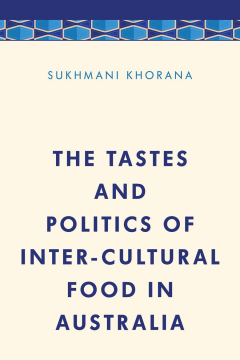
Additional Information
Book Details
Abstract
In the 21st century, an accelerated pace of global movements of people, goods, capital, technology and ideas has led to ambivalence regarding cultural identity for individuals, as well as collectives like neighbourhoods and cities. While the preparation, availability and consumption of diverse foods have become symbolic of the very openness of a place, there are concerns that this is only reflective of a superficial and consumerist form of middle class cosmopolitanism.
Using food-oriented case studies centred on Australian cities and media, Bonding Over Food argues for a processual understanding of cosmopolitanism. Such an approach helps us understand various kinds of social bonds formed over food as ‘convivial’ practices that are potentially ethical and/or reflexive as opposed to being driven by ‘othering’ discourses.
This is a lively and engaging book which brings together fresh thinking on the importance of multi-ethnic food in popular culture and everyday life in Australia. Importantly, Sukhmani Khorana interrogates the political consequences and power dynamics of celebratory cultural consumption through food, as well as the possibilities for connection and transformation.
Hannah Jones, Associate Professor in the Department of Sociology at the University of Warwick
This insightful and eminently readable book provides a timely academic excursion across the Australian intercultural food landscape. Traversing the substantial body of scholarly literature about intercultural food politics, Dr Sukhmani Khorana takes the reader on a tantalising culinary tour across Australian TV food shows, food blogs, food markets and food social enterprises.
Rick Flowers, Senior Lecturer, Adult Learning and Applied Linguistics Program at the University of Technology Sydney
In bringing together academic thinking, personal memories and multi-method research, we finally have a book that offers an engaging and provocative intervention into the hoary seesaw debate about ‘eating the Other’ in food studies. The real strength of this lively book is that Dr Khorana decentres the white ‘food adventurer’. Providing a fresh contribution not only to food studies but also intercultural studies, Khorana’s analysis will inspire important new trajectories for future researchers in a range of disciplines.
Elaine Swan, Senior Lecturer in Human Resources and Organisational Behaviour at the University of Sussex
Food has always been central to how we live together and, as this book acutely shows, how we become more than who we are. Eschewing a superficial white, middle class cosmopolitanism for an understanding of cosmopolitanisation as process, Sukhmani Khorana cleverly examines, across a range of sites, the way food is central to everyday intercultural politics – and gender and class – in Australia. This offers, she argues, the possibility for a critical, resistant conviviality and a more ethical way of living in diversity. This is a must read for all cosmo-multiculturalists!
Greg Noble, Professor at the Institute for Culture and Society at Western Sydney University
This valuable and timely book offers a profoundly nuanced examination of the complex, messy everyday experience of ‘cosmopolitan becomings’—an ongoing process in the (un)making—as revealed through the highly-charged lens of vernacular experiences of food. Across the broad contemporary Australian landscape of food production and consumption – from farmers’ markets, through to food trucks, refuge social enterprises, reality television cooking shows and suburban Indian and South Asian grocery stores – it looks to the ethical possibilities for positive encounter, while always being profoundly attentive to how our engagements with food conviviality are highly charged by the intersectionallity of our belongings.
Susan Luckman, Professor of Cultural Studies at the University of South Australia
Sukhmani Khorana is Senior Lecturer in Cultural Studies at the University of Wollongong. She is the editor of a Routledge anthology titled, Crossover Cinema (2013). Sukhmani has published extensively on diasporic cultures, multi-platform refugee narratives, and the politics of empathy. She holds a current ARC Linkage grant (with the Museum of Victoria and The Australian Centre for the Moving Image) examining the role of television in the experience of migration to Australia.
Table of Contents
| Section Title | Page | Action | Price |
|---|---|---|---|
| The Tastes and Politics of Intercultural Food in Australia | Cover | ||
| Contents | v | ||
| Acknowledgements | vii | ||
| Introduction: Food Cosmopolitanism and Contemporary Urban Australia | ix | ||
| Part 1: White Australians on Food Adventures | 1 | ||
| 1 First Encounters: Exploring Markets and Food Tours | 3 | ||
| 2 Who Is the New Aussie Food Adventurer?: Negotiating Whiteness and Gender in Italian Food Safari and Surfing the Menu | 19 | ||
| Part 2: New Arrivals and Settling In | 37 | ||
| 3 South Asian Grocery Stores in a Sydney Suburb: Conviviality in Transit | 39 | ||
| 4 Refugees and Food: Practicalities and Solidarities | 53 | ||
| Part 3: New Becomes Old, Everyday (and Hip) | 65 | ||
| 5 MasterChef and the ‘Everyday’ Australian: Reception among First- and Second-Generation Migrants | 67 | ||
| 6 No Need to Fear the Middle Eastern Man: ‘Hipster Ethnics’ Disarm with a Dance over Dessert | 81 | ||
| Conclusion: Ethical and Reflexive Food Practices | 97 | ||
| Bibliography | 105 | ||
| Index | 117 | ||
| About the Author | 121 |
